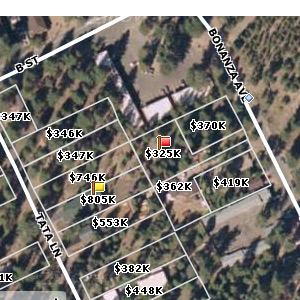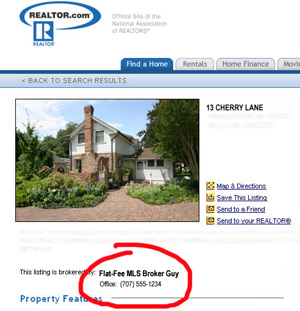|
Shopping for your home
Again, I recommend that
you don't talk with a
real estate agent until
you've done some research on
your own. A buyer's agent
will likely get your name
and phone number, give you a
map and a printout of
available properties in your
price range, and offer to
show them to you. But
accepting that help can cost
you thousands of dollars.
I recommend that you instead
check out alternative
sources of information.
Step 1: Finding a
neighborhood.
-
Zillow.com lets you
explore estimated
property values in
different
neighborhoods.
-
Go to
GreatSchools.net for
information about the
quality of local
schools.
-
City-data.com has
discussion forums about
cities and
neighborhoods. Type a
city and state into the
search box, and you'll
often be rewarded with
local gossip about
different neighborhoods.
-
McCormacks provides
lots of useful
information about
different California
cities.
-
BestPlaces.net
profiles 3,000 cities,
and includes information
about crime, climate,
cost of living, and
schools. Be sure to
check out the site's
Find Your Best Place
calculator.
-
Homefair.com provides
school reports and
city profiles.
-
CNNMoney
compiles an annual list
of the
Best Places to Live
and
Best Places to Retire.
-
Epodunk.com has
profiles of 46,000
cities, including
smaller towns.
-
Forbes
compiles an annual list
of the
Best Cities for Singles.
-
FindYourSpot.com
will also try to match
you with a city that's
right for you.
-
Scorecard.org
measures pollution in
different areas.
-
Neighboroo.com has
color-coded maps that
let you see how
neighboring zip codes
rank in terms of home
prices, school quality,
foreclosure risk, and so
forth.
Some tips
-
The three most important
words in real estate
are, of course,
"location, location,
location."
-
It's
usually a better
investment to buy
the cheapest house in a
neighborhood than the
most expensive house in
a neighborhood.
-
A trick
for finding the best
neighborhoods in a city
is to type in the city's
name at
Realtor.com, look at
the most expensive
listings, and note their
zip codes.
-
When shopping for real
estate, my heart soars
when I see a dirty
kitchen or smell a
grungy carpet. Such
houses normally sell at
a discount, and it
usually doesn't take
much to spruce them up.
 |
Zillow.com
provides "Zestimates"--rough
appraisals of
properties
values--for millions
of homes. By typing
in a city or zip
code, you can pull
up a map that will
let you see how
property values vary
by neighborhood.
But don't put too
much faith in the
Zestimates--they can
be wildly
inaccurate.
|
Step 2: Finding homes
The next step is
to make a list of homes that
appeal to you. Don't
knock on doors or contact
the sellers directly unless
they're selling For Sale by
Owner (FSBO).
Remember, if you attend an
open house or let a real
estate agent unlock a door
for you, it will be more
difficult for you to capture
the commission.
-
Regional Multiple
Listing Service (MLS)
systems. (Click
here or scroll down
to the bottom of this
page for a directory.)
These often provide more
information than Realtor.com. See below
section for a directory
of MLS websites that are
available to the public,
listed by state.
Some real estate agents
offer online access to
the local MLS database,
but you have to register
to access this
information. If you
register, expect to get
a lot of phone calls.
-
Realtor.com
is set up by the
National Association of
Realtors. It
includes listings from
Multiple Listing
Services (MLSs)
throughout the country.
-
Zillow.com doesn't
have as many listings as
Realtor.com, but it
provides a lot of useful
information about
properties.
-
FSBO websites
As I'll explain later,
it's easy to buy them
without going through a
buyers' agent and many
sellers are willing to
drop the sales price by
2-3% if they're spared
the expense of paying
that commission. That
comes to a
$10,000-15,000 savings
on a $500,000 house.
 |
Since real
estate agents
are in the
business of
selling
information,
they're
understandably
reluctant to
give it away for
free.
Fortunately, you
can uncover a
lot of
information
yourself by
doing research
on the Internet
and by visiting
open houses. |
-
Classified ads in the
newspaper.
-
Online classified ad
services, like
Craigslist.org,
backpage.com,
livedeal.com,
base.google.com, and
propsmart.com.
-
Breakfast meetings for
real estate agents.
Many local realtor
associations arrange
weekly breakfast
meetings during which
agents present their new
listings. They're open
to the public, but
hardly anyone outside of
the real estate business
seems to know about
them. Expect to pay $5
or so for coffee and
sweet rolls, and then go
sit in a quiet corner
where you won't attract
too much attention.
You'll often be rewarded
with juicy gossip about
hot properties.
-
Drive around.
just by driving through
neighborhoods. A lot of
homes also have open
houses on Sunday
afternoons--you can
often find them just by
looking for signs.
-
Craigslist.org.
This is an online
classified ad service.
It's a good way to find
FSBOs.
 |
The National
Association of
Realtors (NAR),
which controls
Realtor.com,
won't allow
listings to say
if a home is
being sold "For
Sale by Owner" (FSBO)
or reveal a FSBO
seller's
identity to the
public. There's
a reason for
this.
Knowledgeable
buyers who know
a property's
being sold FSBO
will simply cut
agents out of
the
transaction.
Realtors stand
to lose (and
buyers to gain)
thousands of
dollars if they
succeed. |
Next step: Finding a
discount agent.
Appendix:
Local Multiple Listing
Service (MLS) websites by
state
ALABAMA
ALASKA
ARIZONA
ARKANSAS
CALIFORNIA
COLORADO
CONNECTICUT
DELAWARE
DISTRICT OF COLUMBIA
FLORIDA
GEORGIA
HAWAII
IDAHO
ILLINOIS
INDIANA
IOWA
KANSAS
KENTUCKY
LOUISIANA
MAINE
MARYLAND
MASSACHUSETTS
MICHIGAN
MINNESOTA
MISSISSIPPI
MISSOURI
MONTANA
NEBRASKA
NEVADA
NEW HAMPSHIRE
NEW JERSEY
NEW MEXICO
NEW YORK
NORTH CAROLINA
NORTH DAKOTA
OHIO
OKLAHOMA
OREGON
PENNSYLVANIA
RHODE ISLAND
SOUTH CAROLINA
SOUTH DAKOTA
TENNESSEE
TEXAS
UTAH
VERMONT
VIRGINIA
WASHINGTON
WEST VIRGINIA
WISCONSIN
WYOMING
ŠLori Alden, 2008. All
rights reserved.
|

